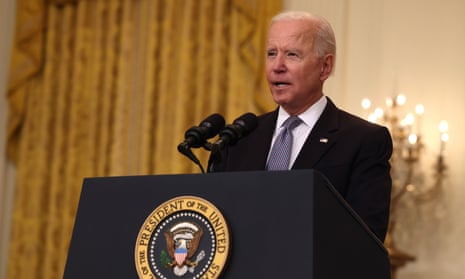Washington will send 20m doses of US-approved coronavirus vaccines overseas by the end of June, Joe Biden confirmed on Monday.
In combination with the 60m doses of AstraZeneca’s coronavirus vaccine that the US has already promised to foreign allies, the Biden administration will send 80m vaccine doses abroad over the next six weeks.
“Our nation is going to be the arsenal of vaccines for the rest of the world,” Biden said in a speech at the White House.
“No ocean is wide enough, no wall is high enough to keep us safe. Rampant disease and death in other countries can destabilize them – those countries – and pose a risk to us as well,” he added.
The Pfizer, Moderna and Johnson & Johnson vaccines are approved for use in the US, and Monday’s move marked the first time the US would be sharing vaccines authorized for domestic use. The AstraZeneca vaccine is not yet approved in the US. It previously shared 4m doses of its AstraZeneca stockpile with Mexico and Canada in March.
On Monday, the president said the US would be sending more vaccine doses to foreign countries than either China or Russia has, and he emphasized his administration would not be asking for “favors” from allies in exchange for the vaccines.
The White House has not said which countries will receive the shots. The press secretary, Jen Psaki, said the administration would announce more in the coming days about how the administration is deciding where to send vaccines.
Tedros Adhanom Ghebreyesus, director of the World Health Organization (WHO), welcomed the move, saying partners of the WHO-backed Covax vaccine distribution platform would “stand ready to support equitable distribution”.
I welcome @POTUS & 🇺🇸's commitment to donate 80M #COVID19 vaccine doses to countries in need. Your commitment to global health is deeply appreciated! #COVAX partners stand ready to support equitable distribution. Solidarity is the only way to save lives & livelihoods everywhere. https://t.co/vep8m7aR51
— Tedros Adhanom Ghebreyesus (@DrTedros) May 17, 2021
On Monday, Biden celebrated the news that coronavirus cases are decreasing in all 50 US states for the first time since the pandemic started, marking a crucial moment in the country’s fight against the virus.
The president also announced that Tuesday’s data will show 60% of American adults have received at least one coronavirus vaccine dose.
Biden has set a goal of getting 70% of American adults at least partially vaccinated by 4 July, and the president emphasized that unvaccinated Americans still face the risk of infection.
“Ultimately, those who are not vaccinated may end up paying the price,” Biden said. “We’re not done fighting this virus.”
Many US allies had called on the Biden administration to send more vaccine doses to other countries, noting that the pandemic will not truly come to an end until vaccines are widely available around the world.
Biden said last week that almost half of the world’s leaders had contacted his administration asking for help in getting access to more vaccine doses.
“I literally have, virtually 40% of the world leaders calling and asking, can we help them,” Biden said. “We’re going to try.”
A recent surge of coronavirus infections in Taiwan, formerly one of the world’s Covid-19 mitigation success stories, has led to its stock of 300,000 doses rapidly running out, with only about 1% of its 23 million people vaccinated. The state department did not respond when asked what specific assistance was being offered to Taiwan.
Reuters and Associated Press contributed to this report
